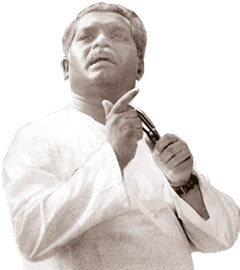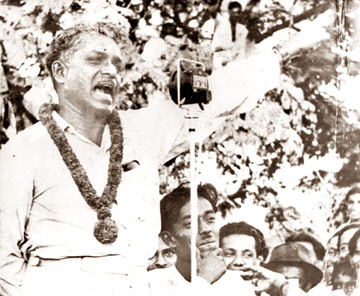Philip Gunawardena
an illustrious son of the soil:
W. T. A. Leslie FERNANDO
 In the beginning of the 20th century there lived in Hevagam Korale in
the Kelani Valley a wealthy landowner called Don Karolis Rupasinghe
Gunawardena. A Vidane Arachchi with a commanding personality, he was
popularly known as Boralugoda Ralahamy'. He was married to Dona Liyanora
Gunasekera, a kula kantava (noble lady) from Samanabedda in Siyane
Korale. Philip was the fourth son of ten children, three boys and seven
girls born to them. In the beginning of the 20th century there lived in Hevagam Korale in
the Kelani Valley a wealthy landowner called Don Karolis Rupasinghe
Gunawardena. A Vidane Arachchi with a commanding personality, he was
popularly known as Boralugoda Ralahamy'. He was married to Dona Liyanora
Gunasekera, a kula kantava (noble lady) from Samanabedda in Siyane
Korale. Philip was the fourth son of ten children, three boys and seven
girls born to them.
| The death
anniversary of Don Philip Rupasinghe Gunawardena, an
illustrious son of the soil, great statesman and father of
socialism in Sri Lanka falls today. A colourful personality
who towered the political scene of the country for over four
decades,
he was called the 'Lion of
Boralugoda'. |
Philip was born on January 11, 1901 at Boralugoda Walawwa in Kosgama.
He read his 'Sakaskada' at the Boralugoda Temple and had his primary
education at Siddhartha Vidyalaya, Kaluaggala built by his father. He
had his secondary education at Prince of Wales College, Moratuwa and
Ananda College, Colombo.
Family roots
The Gunawardenas were prominent gentry in the Hevagam Korale. Philip
grew up with his brothers and sisters in the lap of luxury. Boralugoda
Ralahamy was a patriarch who raised his children to be devout Buddhists,
proud of their Sinhala heritage. Even as teenagers, Philip and his
brothers were attracted to the stirrings of nationalism.
While studying at Ananda College, Philip and his brother Robert took
up residence at the house of T. B. Jayah, a statesman involved in the
freedom struggle, who at the time was a teacher at Ananda College. While
being there, Philip came into contact with Anagarika Dharmapala,
Walisinghe Harischandra and John de Silva at the residence of W. A. de
Silva and was inspired by their patriotism.
After passing the London Matriculation from Ananda, Philip joined the
University College and followed a course in economics. As a young
student, Philip attended the meetings of the National Congress but later
became a sympathiser of 'Young Lanka League', a radical organisation led
by Victor Corea, A. E. Gunasinghe and C. H. Z. Fernando.
Boralugoda Ralahamy now wanted to send his promising son to England
to become a Barrister-at-Law. But Philip turned to America and sailed to
the USA. He studied two years at the University of Illinois and four
years at the University of Wisconsin and obtained a doctorate in
Agricultural Economics.
While in the United States, Philip came under the influence of Scot
Nearing, the pioneer Professor in Socialism and became a socialist. He
worked in collaboration with Indian socialists Jayaprakash Narayan,
Seyed Hussain, J. C. Kumarappa and the Mexican revolutionary Jose
Vanconcelaus. In New York, Philip participated in trade union activities
and once some Negro workers in the city carried Philip on their
shoulders for leading them to win their demands.
Political figure
In 1928, Philip came to the UK and became a member of the Communist
Party. He participated in the activities of the Indian League with
Krishanan Menon. He organised anti-imperialist activities with Jomo
Kenyata of Kenya, Ram Gulam of Mauritius and Tuan Malacca of Malaya.
Philip was a fascinating speaker who propounded socialism attacking the
imperialist machinery and Hyde Park Corner in London used to reverberate
with his thunderous voice.
While in England, Philip gradually moved away from the Communist
Movement. He was taken up by the criticism of the Stalinist regime in
Russia by Leon Trotsky and became a Trotskyite. In England, Philip met
Dr. N. M. Perera, Dr. S. A. Wickremasinghe, Dr. Colvin R. de Silva and
Vernon Gunasekara. He formed a Marxist circle with them and that became
the nucleus of the LSSP in our country.
Leadership
The imperial Government had impounded the passport of Philip because
of his Marxist activities. It was only after the intervention of Sir D.
B. Jayatilaka at the request of Boralugoda Ralahamy that Philip was
allowed to return to Sri Lanka.
Philip landed in Sri Lanka on November 01, 1932 and he began to
organise a broad based movement against the colonial set up. His
strategy was to form a single political party that would give the
leadership to both the anti-imperial struggle and the socialist
movement. When N.M., Colvin and Leslie returned to the island, Philip
had already initiated the proletarian movement.
The first socialist party in Sri Lanka, the LSSP was inaugurated on
December 18, 1935. Philip Gunawardena was the energy and brains behind
the party. Although Philip pushed Colvin to be the first president of
the party, all were conscious that Philip was the real leader. (Dr. N.
M. Perera; Philip Gunawardena, the Father of Socialism in Ceylon -
'Daily Mirror', March 28, 1972). The LSSP adopted a manifesto to obtain
full independence and establish a socialist society. It avoided
controversial issues like Trotkyism and Stalinism.
Directing force
Philip was a dynamo of activity and he was the directing force of the
LSSP. People were attracted by his fire-brand speeches that mesmerised
the audience. They were taken up by his charismatic personality and his
sincerity of purpose.
In 1936, State Council elections, Philip comfortably won the
Avissawella Seat and N.M. won Ruwanwella. The political duo Philip and
N.M. vociferously championed the cause of the underprivileged in the
State Council. They voiced the sentiments of the masses against
oppression of rulers, drawbacks of the Ministers and injustices of
various officials and unmasked them. N.M. took the lead from Philip whom
he admired to the point of hero worship. (Charles Wesley Ervin - 'Philip
Gunawardena the making of a Revolutionary, 2001 - page 24).
The reactionary elements got alarmed when the LSSP rapidly gained
ground in the country, and tried to suppress it. They sent thugs to
suppress the LSSP meetings. But Philip and Robert used both brains and
brawn and with the assistance of Harbour workers made those hirelings
run for their lives. Strangely enough in many instances Philip was taken
to Courts as an accused but he was honourably acquitted in all the
cases.
Imprisoned
During the World War II, the Colonial Government proscribed the LSSP
and its leaders Philip, N.M., Colvin and Edmund Samarakkody were
imprisoned. In the confusion that followed after the Japanese bombed
Colombo on April 05, 1942, the LSSP leaders broke the Bogambara jail and
escaped. Later, some of them fled to India and accordingly Philip lived
in India under the assumed name Curusamy. Later his wife Kusuma too fled
to India and joined him. Their eldest son was born in India and they
named him as Indika.
Soon Philip and N.M. were arrested in India and brought back to Sri
Lanka. They were sentenced to six months' rigorous imprisonment for
breaking the jail. In prison Philip had to husk coconuts and he learned
to rattan chairs. When the War ended in 1945, Philip and N.M. were
unconditionally released.
Formation of VLSSP
In 1947 Parliamentary elections, Philip won Avissawella as the
candidate of the LSSP with an overwhelming majority.
However, in 1948, he forfeited the seat when he was sentenced to
three months' rigorous imprisonment over an incident in the South
Western bus strike. Kusuma was returned uncontested in his place for
Avissawella.
In 1950, when the LSSP and Bolshevik Leninist Party merged, Philip
left the party with his band of 42 supporters who were mainly Harbour
workers, peasants and swabhasha teachers and formed the VLSSP. In 1951,
the VLSSP formed a united front with the Communist Party. The LSSP and
CP-VLSSP United Front organised the famous 1953 Hartal which was a
success.
By 1955, Philip shifted his political orientation. From being a
figure subscribing to the basic Marxist tenets of the need for a
dictatorship of the proletariat, he was gravitated to a position which
recognised the need to go beyond the urban working class and rural
labourers and ally with other social formations in rural Sri Lanka. (Dr.
Ananda Meegama; Philip Gunawardena and the 1956 Revolution in Sri Lanka,
2008 - page 43). Accordingly in 1956, the VLSSP joined the Non-Marxist
parties like the SLFP and Bhasha Peramuna to form the MEP.
At the 1956 General Elections, the MEP which got the blessings of
Sangha, Veda, Guru, Govi, Kamkaru: Pancha Maha Balavegayas gained the
power. As the Minister of Agriculture, Food and Co-operatives Philip
Gunawardena forged ahead with a radical agenda.
Philip introduced the Paddy Land Act to emancipate the tenant farmer
and increase the yield. Multi-Purpose Co-Operative Scheme to ensure
proper distribution of produce and the Co-Operative Development Bank
which was later renamed and implemented as the People's Bank to uplift
the rural sector.
During the three years tenure of Philip Gunawardena as a Minister,
there was unprecedented development and growth in every subject under
its purview Philip was the force behind the nationalisation of bus
transport and the Port. He was also instrumental in the take over of
British Air Force base at Katunayake and Naval Base in Trincomalee to
remove last shackles of colonial rule.
Leader of common man
 |
|
Philip
Gunawardena addressing a public rally. File photo |
In 1965, Philip joined the coalition Government of the gentleman
politician Dudley Senanayake. Although Philip was much criticised about
that move, Philip achieved so much as the Minister of Industries and
Fisheries in 1965-70 Government.
He set up the Industrial Development Board and introduced a national
industrial policy. He streamlined many public corporations to make them
viable institutions. He developed Tyre and Steel Corporations with the
help from the Soviet Union. He got Chinese and Japanese aid and
facilitated the mechanised fishing industry. It was he who put Fisheries
Corporation into operation.
To the surprise of many, Philip lost the Avissawella Seat in the 1970
elections. But he was not disheartened. He wanted to re-orient the MEP
to suit the changing times but he unexpectedly fell ill. He passed away
on March 26, 1972.
At his death, it was Dr. N. M. Perera, one time his close ally and
later a bitter foe in politics that paid the greatest tribute to Philip.
He expressed thus on Philip. "History will no doubt accord him his
rightful place in the political life of this country. In the years to
come, when lesser mortals like us have played their evancent part and
vanished into the limbo of forgotten, a grateful socialist Ceylon will
remember him with pride and place him in the worthy pedestal due to
him."
Philip Gunawardena was a man of vision who realised that national
development should be in harmony with our much cherished spiritual and
cultural values. And he was a man of stern moral rectitude. The District
Judge who dismissed a defamation case filed by a senior DIG against him
declared that Philip was an embodiment of honesty and integrity.
Philip led an unostentatious family life. He and Kusuma were blessed
with four sons and one daughter. They all are shinning stars in their
various fields. The personal life of Philip epitomised the cream of high
moral values found in our rich cultural heritage disciplined by Buddhist
way of life.
Philip Gunawardena was indeed a statesman par-excellence.
(The writer is a former High Court Judge and Vice-President of the
Newman Society Alumni Association) |





